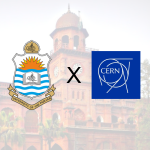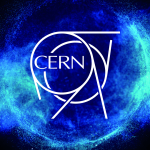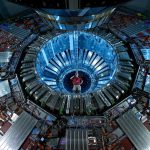Discover the remarkable journey of Pakistani students at CERN, exploring particle physics and their contributions to global scientific progress.
Table of Contents
A group of Pakistani students from various schools has been selected to participate in a prestigious program offered by CERN. This exceptional opportunity arose when their proposal on particle physics outshone 379 other global entries in the renowned Beamline for Schools competition. These students have now been invited by CERN to embark on a scientific journey in Geneva.
In order to determine the composition of the T10 beamline of the CERN Proton Synchrotron accelerator, the students will conduct an experiment at CERN (Conseil Européen pour la Recherche Nucléaire).

Pakistani students performing their experiment at the Beamline for Schools competition.

The Pakistani student team “Particular Perspectives” presented their experiment idea at CERN after being selected from students in 63 different nations.

Beamline for Schools (BL4S)
The Beamline for Schools (BL4S) competition by CERN is a groundbreaking initiative that opens doors for high school students worldwide to explore the intricate world of particle physics. The competition’s prize is nothing short of extraordinary – the chance to conduct a 10-day experiment at Conseil Européen pour la Recherche Nucléaire’s cutting-edge facilities in Geneva.
BL4S has been a transformative platform for aspiring scientists, enabling Conseil Européen pour la Recherche Nucléaire to engage with over 1,312 teams comprising nearly 11,000 students from various corners of the globe. These students have had the unique opportunity to experience the wonders of particle physics research firsthand, a truly invaluable experience.
Also read: CERN Short Term Internship 2023 in Switzerland: For Scientific & Administrative Fields
Beyond the scientific aspects, BL4S encourages students to test their mettle as innovators, problem solvers, and collaborators. It serves as a catalyst, motivating them to explore careers in science, technology, engineering, and mathematics (STEM), a crucial response to the growing demand for a skilled STEM workforce.
To participate, students craft experimental proposals, often with guidance from the International Particle Physics Outreach Group (IPPOG) and physicists from around the world. Winning teams not only earn scientific recognition but also tangible rewards. They receive a cosmic-ray detector for their school, introduced for the first time in 2016, along with BL4S t-shirts for team members. Some also have the opportunity to visit a nearby physics laboratory. Every BL4S participant receives a certificate, commemorating their scientific journey.
The victorious teams are then invited to CERN, where they embark on the thrilling adventure of conducting their experiments. This once-in-a-lifetime experience has been seized by 14 teams so far. Over the years, winning teams have hailed from diverse countries, including Greece, the Netherlands, Italy, South Africa, Poland, the U.K., Canada, India, the Philippines, the Netherlands, the USA, Switzerland, and Germany.
Also read: Fully funded Short Term CERN Internships for Bachelors/Masters Students – 2023
CERN, the European Organization for Nuclear Research
CERN (Conseil Européen pour la Recherche Nucléaire), the European Organization for Nuclear Research, stands as a global beacon of scientific discovery. Its physicists and engineers utilize the world’s largest and most intricate scientific instruments to unravel the mysteries of the universe’s fundamental building blocks – fundamental particles.
At CERN, subatomic particles are accelerated to velocities close to the speed of light and then collide. This complex process yields crucial insights into how these particles interact and provides a profound understanding of the fundamental laws of nature. Its mission is to push the boundaries of human knowledge by delving into the smallest constituents of our universe.
Its origins trace back to an intergovernmental meeting of UNESCO in Paris in December 1951, where the first resolution advocating the establishment of a European Council for Nuclear Research – CERN – was adopted. Two months later, an agreement was signed to establish the provisional Council, marking the birth of the acronym CERN.
Also read: Pakistan’s Science and Tech Minister Meets CERN Delegate
Pakistan‘s Significant Contribution to CERN
Pakistan has made remarkable contributions to CERN, a world-renowned scientific research organization based in Switzerland. Let’s explore Pakistan’s valuable role in its endeavors in simple terms.
A Special Status: Firstly, it’s important to know that Pakistan holds a unique position at CERN. In 2015, Pakistan became an Associate Member State of CERN. This means that Pakistan is a special partner in CERN’s scientific activities.
Conseil Européen pour la Recherche Nucléaire’s Big Mission: It is like a big club of scientists and engineers from different countries. They are on a mission to understand the tiniest building blocks of everything around us. They use powerful machines called particle accelerators to do experiments and learn new things about these tiny particles.
Pakistan’s Part in CERN: Pakistan’s involvement with it is led by the Pakistan Atomic Energy Commission (PAEC). This commission uses nuclear technology in various fields, like making power, helping in medicine, and improving agriculture.
A Long Friendship: Pakistan and Conseil Européen pour la Recherche Nucléaire have been working together for a long time, dating back to the 1960s. However, their official partnership started in 2015 when they signed an agreement to work together more closely.
Helping Build Big Machines: One of the most impressive things Pakistan has done is help build the Large Hadron Collider (LHC). The LHC is a colossal machine, like a massive ring of magnets, designed to study particles. Pakistan played a crucial role in making this amazing machine.
Making Heavy Parts: Pakistan’s contribution includes making heavy parts for CERN’s experiments. These parts were created at the Heavy Mechanical Complex-3 (HMC-3) in Taxila. They are essential for its scientific work.
High-Tech Support: Pakistan isn’t just about heavy machinery; they’ve also provided high-tech support. This includes things like computer chips, lasers, and other advanced equipment used in experiments.
Scientists in Action: Many Pakistani scientists and engineers are actively involved in its big experiments. They’re learning a lot and sharing their knowledge with Pakistan, which is a great thing for science in the country.
A Chance for Pakistani Companies: It’s not just scientists benefiting from this partnership. Pakistani companies have the opportunity to work with it too. They can create software, machines, and other things that CERN needs.
A Bright Future: Pakistan’s contribution to Conseil Européen pour la Recherche Nucléaire is a testament to its dedication to science and innovation. It’s not just about building machines; it’s about being part of something bigger, a global community of scientists working together to unlock the secrets of the universe.
Also read: Pakistan’s Contributions to CERN

Send us your name on WhatsApp to subscribe to the latest scholarship and internship information.
![]()

Writer and learner for life!





